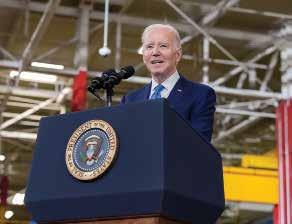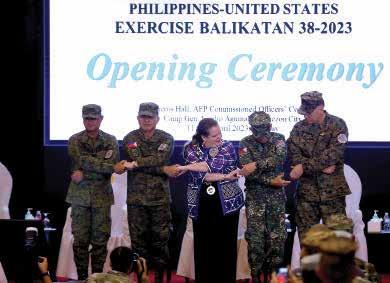
1 minute read
Biden ends US COVID emergency status

WASHINGTON — U.S. President Joe Biden on Monday, April 10 officially ended the COVID national health emergency that for more than three years underpinned extraordinary efforts to provide care for a country where more than a million people died from the disease.
Advertisement
The White House said Biden signed a law passed earlier by Congress “which terminates the national emergency related to the COVID-19 pandemic.”

This closes lavish funding streams for COVID tests, free vaccines and other emergency measures thrown together — starting in January 2020 — to try and free the world’s biggest economy from the grip of the global pandemic.
Less clear is the impact the end of the emergency will have on the already tense southern border with Mexico, where U.S. authorities have long struggled to manage the flow of undocumented immigrants and large numbers of asylum seekers.
A rule known as Title 42 was used during the official health emergency to impose stringent restrictions on acceptance of undocumented arrivals. That is set to end, forcing the administration to adopt a different legal mechanism if it wants to avoid the politically damaging potential of new influxes.
A senior official in the White House told AFP that the use of Title
EDCA sites not for offensive actions – Pres. Marcos
Galvez Jr. and their American counterparts Secretary of State Antony Blinken and Defense Secretary Lloyd Austin III shared the need to modernize relations between Manila and Washington. "Our security alliance is an enduring source u PAGE 2 by Helen Flores Philstar.com
MANILA — The four new sites within Philippine military bases made accessible to U.S. forces under the Enhanced Defense Cooperation Agreement (EDCA) will not be used for offensive operations, President Marcos said on Monday, April 10.
The president made the remarks when asked to comment on China’s recent pronouncement that the designation of new EDCA locations would provoke tensions in the region.
“Now, China’s reaction perhaps was not surprising because they are worried. But we will not – we will not use, we will not allow, the Philippines, we will not allow our bases to be used for any offensive action. This is only to help the Philippines when the Philippines needs help,” Marcos told reporters partly in Filipino after leading the 81st Araw ng Kagitingan rites in Pilar, Bataan.
“So, if no one is attacking us, they don’t have to worry because we will not launch an offensive. What we do is we continue to strengthen the defense of our territory, the defense of the Republic,” he said.
This developed as the biggest ever iteration of the Balikatan exercises involving some 17,600 Filipino and American soldiers officially began on Tuesday,










